#and i promise there will be at least one zoro this year. memory willing
Explore tagged Tumblr posts
Note
Happy Halloween!
HAPPY HALLOWEEN! thank you for thinking about this blog even though it's been. a hot minute
#ask#anon#not zoro#it's been. so long#but i am caught up on op again!#i fell off during the middle of egghead but i'm back now#and i promise there will be at least one zoro this year. memory willing#the time will come when i do come back to this blog full time#it's just not right now unfortunately
6 notes
·
View notes
Text
Tragedy Without Melodrama
Webster defines melodrama as “a sensational dramatic piece with exaggerated characters and exciting events intended to appeal to the emotions” and tragedy as “serious drama typically describing a conflict between the protagonist and a superior force (such as destiny) and having a sorrowful or disastrous conclusion that elicits pity or terror”.
These two categories tend to overlap, but they don’t have to. It can be difficult to hit the sweet spot between genuine emotion and wangst, and it’s generally pretty easy to tell when an author has ham-fisted a tragic backstory for the sake of cheap drama.
One Piece has its fair share of exaggerated characters, and no one can deny that it’s meant to appeal to emotion over critical thought. When Oda has his audience feel pity over a boat you know you’re at least dabbling in the melodramatic, but there’s one particular backstory that stands out from the rest with its lack of melodrama, and that’s Brook’s.
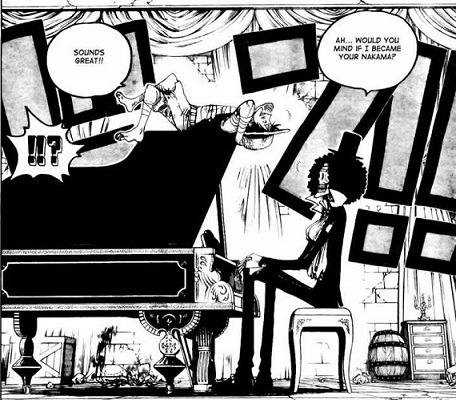
The vast majority of the time Oda uses his backstories to help the audience recontextualize a character’s motivations and actions. Backstories in One Piece lay out dreams, clarify important historical events, and give the reader a reason to care. Most often they’re placed in high leverage situations to help raise the tension for later parts of the arc. Hell, in the manga Chopper’s backstory comes mid-punch.
Brook’s backstory is different. The important bits are sprinkled out throughout the Thriller Bark arc. The audience learns the pertinent pieces of information when they’re most relevant, and by the time he’s formally introduced to the crew his past with Laboon, his promise, and his preoccupation with his ‘fro are already explained.
Unless one counts Luffy (I don’t), then Usopp is the only other Straw Hat whose past is fully revealed at the end of their recruitment arc, and Merry’s (the character, not the boat) explanation to Kaya takes approximately three pages to get through.
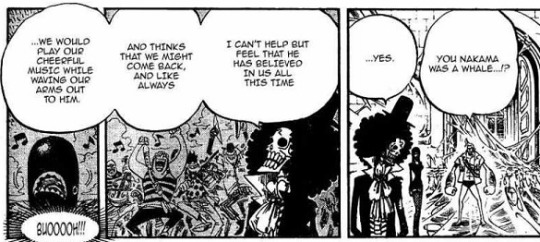
(Pictured: Franky echoing the reader’s reaction for the benefit of those who forgot the random whale from 400 chapters ago)
When talking about all the ridiculously tragic backstories in One Piece, I feel like Brook’s sometimes gets lost in the shuffle. The guy spent 50 years alone on a boat with nothing but the remains of his dead companions for company. He lost his shadow and his pride when he was twice bested by Ryuuma. Sunlight harms him. He’s a walking, talking skeleton desperately clinging to the last vestiges of his humanity for the sake of a friend he’s not sure is alive, let alone willing to see him again.
And let’s not forget that Brook was the acting captain of the Rumbar Pirates at the time of their demise. He was responsible for their health and well-being, and he wasn’t strong enough to protect them any more than he was able to protect his former captain when he contracted a deadly disease.
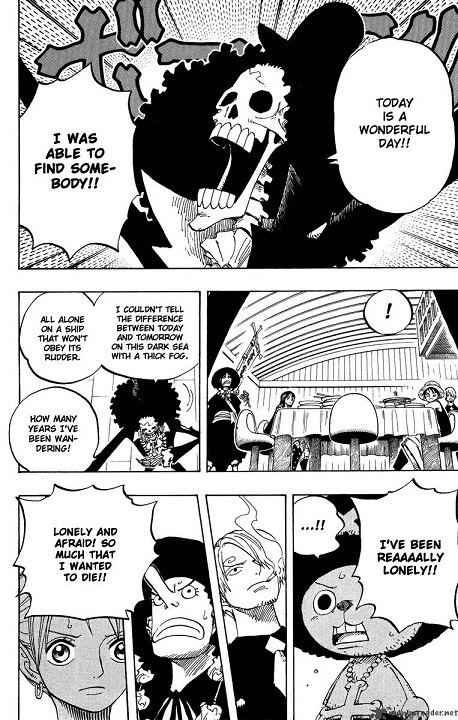
Brook is so unflinchingly optimistic that it’s easy to forget how much his life sucks. There’s a fairly popular fan theory that he’s a few bones short of a skeleton, and canon shows some evidence to support that he might have - for lack of a better term - cracked under the strain of isolation.
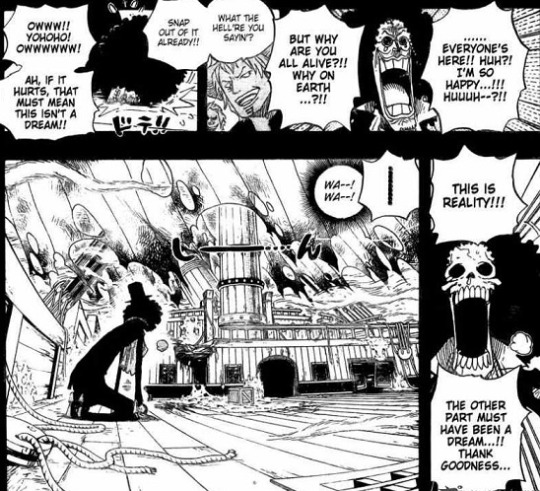
But this tragedy doesn’t feel like tragedy, and that’s because Oda frames it within the context of victory. The Straw Hats have won the day. Everyone has had their shadows returned, and despite Zoro’s best efforts no one died. In true Straw Hat fashion there’s a party. Past and present are linked with a rousing rendition of Bink’s Sake, and I think it’s important that Luffy has already heard of the song through Shanks.
Also, here’s a cover of Bink’s Sake by a professional violinist. It’s awesome.
youtube
The lyrics of Bink’s Sake parallel Brook’s backstory. The first couple of stanzas talk about going out to sea and facing stormy seas, but then there’s a line about “the dawn will surely rise”, and that’s exactly where Brook is at this point in his (second) life. The upbeat, peppy tune the anime adds doesn’t hurt one bit with the overall tone Oda is going for.
As the Rumbar Pirates die off one by one, Brook remarks that all that’s left is the accompaniment, leaving the song incomplete. It is perfectly fitting, then, when this final swan song is intercut with Luffy and co. singing along while Brook plays the piano in the present day.
Coming in at approximately two chapters, Brook’s backstory doesn’t overstay its welcome. Oda isn’t concerned with dropping mind-blowing plot twists or adding cheap drama for the sake of an emotional response. Since the audience has already been given the broad details of his past, these two chapters are more for Brook’s sake than the reader.
Brook is the only Straw Hat who lived a relatively normal life into adulthood. The Rumbar Pirates were just as dear to him then as the Straw Hats are now. Brook’s backstory is about closure, and that’s why it’s framed the way it is. Oda allows the Rumbar Pirates to bow out with dignity and grace, lessening the blow of their deaths with the knowledge that the Straw Hat Pirates are a second chance to go along with his second life. This is punctuated when the Straw Hats build the Rumbar Pirates a memorial before setting off for Fishman Island while getting confirmation from Luffy that Laboon is still waiting for him.
Brook suffers just as much as anyone within the Straw Hat Pirates, but where other backstories are presented as the deepest lows that a character must climb out of, Brook’s is the story of the hope of a new dawn after a darkest night.
But that’s enough of me rambling. I think I’ll just let Brook speak for himself
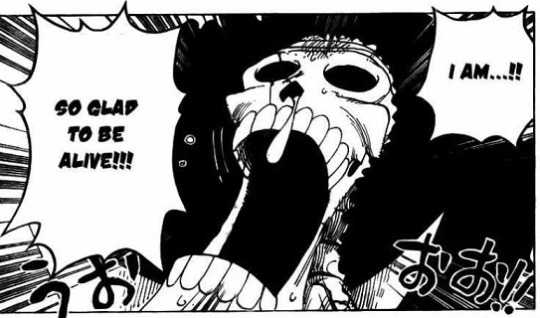
148 notes
·
View notes